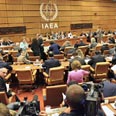
UN: Questions about military aspects on Iran nukes
International Atomic Energy Agency says has pressed Islamic Republic to clarify its uranium enrichment activities, reassure world it's not trying to build atomic weapon. Official says Iran has yet to provide substantial response
Iran is stonewalling the UN nuclear watchdog agency about "possible military dimensions" to its suspect nuclear program, officials said Friday, urging the regime to clarify the mysterious role of a foreign explosives expert and shed light on other issues.
A senior Iranian envoy angrily denounced the assessment as "fabrication," insisting his country has gone out of its way to be transparent and cooperative.
In its latest report, the International Atomic Energy Agency said it has pressed the Islamic Republic to clarify its uranium enrichment activities and reassure the world that it's not trying to build an atomic weapon.
Ahead of Sept. 2 six-power talks on Iran - and a key meeting of the IAEA's 35-nation board a week after that - the IAEA acknowledged that Tehran has been producing nuclear fuel at a slower rate and has allowed UN inspectors broader access to its main nuclear complex in the southern city of Natanz.
But the Vienna-based agency delivered a blunt assessment: "Iran has not suspended its enrichment-related activities."
"There remain a number of outstanding issues which give rise to concerns and which need to be clarified to exclude the existence of possible military dimensions to Iran's nuclear program," said the text, a copy of which was obtained by the Associated Press.
It said the IAEA "does not consider that Iran has adequately addressed the substance of the issues, having focused instead on the style and form ... and providing limited answers and simple denials."
The report raised the specter of harsher international sanctions against Iran for not answering lingering questions about its nuclear activities.
'Iran not cooperating'
President Barack Obama has given Tehran something of an ultimatum: Stop enriching uranium, which - if done at a high level - can produce fissile material for the core of a nuclear weapon - or face harsher penalties. In exchange, it could get trade benefits from the six countries engaged in the talks: the United States, Britain, China, France, Germany and Russia.
Despite the pressure, senior UN officials said Friday that Iran has been feeding uranium ore into its 8,300 centrifuges at a reduced rate, suggesting that sanctions already in place may be hampering its program.
"We need further explanations," said a Western diplomat, declining to be identified because he was not authorized to publicly discuss the confidential report.
The IAEA also chided Syria for not fully cooperating on efforts to clear up questions about whether it was trying to build a nuclear complex at a desert site bombed by Israel in 2007.
In response to the report, the US State Department said Iran is not cooperating with the international community.
"Based on what we have seen in press reports ... It seems clear that Iran continues to not cooperate fully and continues its (uranium) enrichment activities," State Department spokesman Ian Kelly told reporters, saying he could not fully discuss the report because it remained in "restricted" form.
Meanwhile, French Foreign Minister Bernard Kouchner said that if the international community fails to impose sanctions on Iran for its nuclear program through the United Nations, the European Union will impose sanctions of its own against the Islamic Republic.
At a press conference in France, Kouchner said attempts were being made to convince Russia and China, two permanent members in the UN Security Council, to revoke their objection to imposing sanctions against Iran.










